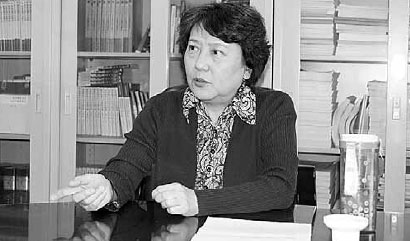Tree of knowledge offers more than maple leaves
Updated: 2013-12-15 08:12
By Shi Xi(China Daily)
|
|||||||
The maple leaf, a small population and vast territory. These three characteristics might encapsulate the perception of Canada for most Chinese people. But for Yang Lingxia, a scholar of Canadian studies at Nankai University, Canada has a lot more to teach.
"Canada is a country with more than 100 ethnic groups living in harmony; multiculturalism was adopted as national policy back in 1971. Experience from Canada is valuable for China to build a harmonious society," Yang says.
Having studied Canadian history for more than 20 years, Yang is one of the most renowned Canadian studies scholars in China.
In October, Yang received the Governor General's Medallion from the current Governor General of Canada, David Johnston, for her work in promoting research on Canada and initiating academic communication activities between China and Canada.
This is the first time that the medal has been given to a Chinese social science scholar.
Born in 1955, Yang is the daughter of the late Yang Shengmao, the academic authority of US history in China.
The academic ambience of Yang's family had a great influence on her during childhood. "All the guests were learned scholars, and all the stories I listened to were historical anecdotes," Yang says.
Three years after the National College Entrance Examination resumed in China, she sat for the exam in 1979 and was enrolled in the history department at Nankai University.
However, it was not until 1990, when she participated in the writing of the Concise History of Canada, that she started her journey in Canadian studies.
"Back then, we had very limited resources for research. There was no Internet or any database. All we could do was travel back and forth between Tianjin and Beijing to look for materials in the libraries," Yang recalls.
The book was published in 1994, and it remains a must-read for researchers in the field of Canadian history studies.
In 1995, Yang was able to visit Canada as a visiting scholar at the University of Toronto. The 10-month immersion in Canadian society was a precious opportunity for Yang to take a deeper look in person into the country she had been studying for years on paper.
When she came back, Yang developed a series of courses on the history of Canada on different levels for undergraduates and graduate students, and she served as the director of the Center of Canadian Studies at Nankai University.
"Besides teaching my students about Canadian history, I place more emphasis on training them the methodology of history study," Yang says.
Every year at Nankai University, there are always some undergraduate students who choose to continue in the field of Canadian studies under Yang's guidance.
"Yang is the only one who concentrates on the research and teaching the history of Canada wholeheartedly all around the country," says Ding Jianmin, Yang's colleague at Nankai University, who was once a graduate student of Yang.
Yang is the first doctoral supervisor in the Chinese academic field to tutor doctoral students majoring in Canadian History, and she was elected as President of the Association for Canadian Studies in China in 2012.
"Since last July, there have been more than 400 social science academic papers about Canada published. I know some of the authors, but there are a lot of new names among them," Yang says. "I am glad to see that more and more young scholars are gaining an interest in Canadian studies."
Xing Yi contributed to this story.
sundayed@chinadaily.com.cn
|
Yang Lingxia is one of the most renowned Canadian studies scholars in China. Provided to China Daily |
(China Daily 12/15/2013 page4)
